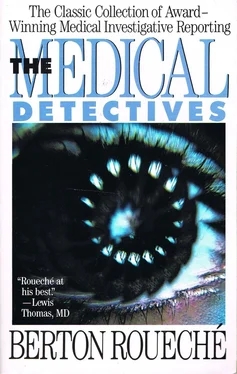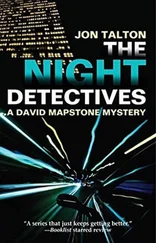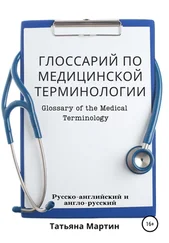"I tell you, I was shaken. I was frightened. And when I got home I got to thinking. I don't know how such things happen. Bui I got to thinking about that flower show, about how I'd felt the next day. And the more I thought about it, the more I wondered. I went to the phone and called the Pennsylvania Horticultural Society and talked to a woman who had something to do with the annual show. I asked her about the use of pesticides and insecticides. She said the society had nothing to do with that. That was up to the individual exhibitors—and there were hundreds of them. She thought it was very probable that some of them, maybe all of them, went in for some sort of chemical control. I thought so, too."
Dr. Page smiled her wide smile and shook her head. The smile faded away. "I'm just beginning to realize that the world is a very dangerous place. It's something nobody really wants to think about. I mean the thousands and thousands of toxic chemicals that have become so much a part of modern living. I mean the people who use them without really knowing what they can do. I mean the where and how and why they use them. It's frightening. I think I'm pretty much recovered now. I haven't had any trouble for over a year. But you never know. The only thing I'm sure of is that I'm going to have to be very careful for the rest of my life."
[1988]
CHAPTER 24
A Lean Cuisine
One cold March morning in 1985, Dr. J. Michael McMillin, professor of medicine and head of the Division of Endocrinology at the University of South Dakota School of Medicine and associate chief of staff for research and development at the Veterans Administration Medical Center in Sioux Falls, was walking along a corridor in Sioux Valley Hospital there when he was hailed and stopped by a colleague named James Felker. Dr. Felker was a Sioux Falls internist with a practice that extended throughout the surrounding countryside, and Dr. McMillin knew him to be something of a diagnostic perfectionist.
"Mike," Dr. Felker said. "I've got a little diagnostic problem. What do you know about thyroiditis?"
"What do you want to know?" Dr. McMillin said.
That was a reasonable response. Thyroiditis, as its name suggests, is an inflammation of the thyroid gland. The thyroid, which is common to all mammals, shares membership with the parathyroid, the pituitary, the adrenals, the pancreas, and the gonads in the masterly hormonal manufactory known as the endocrine system, and is situated astride the throat, just below the Adam's apple. Thyroid disease, in general, reflects either an inadequate production of the thyroid hormones (two amino acids that contain iodine) or an excessive supply of them. The former condition is called hypothyroidism. The latter is called hyperthyroidism or, more descriptively, thyrotoxicosis. The usual cause of thyrotoxicosis is a derangement of the body's immune system, producing antibodies that stimulate the thyroid to an excessive hormonal output. This is the condition more familiarly known—in commemoration of the Irish clinician Robert James Graves (1796—1853), who drew a full-length portrait of it—as Graves' disease. There are, however, other avenues by which the body can be oversupplied with the thyroid hormones. One of these is by direct ingestion. Many health stores, for example, offer their credulous clientele a thyroid preparation as a bracing dietary supplement. Another, and more common, cause of thyrotoxicosis is an inflammation of the thyroid gland, which forces a leaking into the bloodstream of a quantity of hormone normally held in storage. Thyrotoxicosis, whatever its origin, is marked by a panoply of discordant signs and symptoms that include restlessness, irritability, weight loss, increased appetite, rapid heartbeat, a pronounced sensitivity to heat, shortness of breath, and, occasionally, pain or tenderness in the area of the thyroid gland.
Dr. Felker's response to Dr. McMillin's question was also reasonable enough. He said he had a patient over in Valley Springs who clearly was suffering from thyrotoxicosis. Valley Springs is a farming hamlet (pop. 801) ten miles east of Sioux Falls and less than a mile from the Minnesota border. As a matter of fact, the patient was the Valley Springs postmaster, Richard Jacobson. The diagnosis of thyrotoxicosis derived from the presence in his blood of high levels of thyroid hormone. But it was a thyrotoxicosis that confounded Dr. Felker's understanding of the disease. For one thing, the standard evaluation of thyroid function (a test involving a small dose of radioactive iodine and surveillance by Geiger counter) showed that Jacobson's thyroid wasn't overexerting itself—it was, in fact, underactive. The other thing that puzzled him was that Jacobson insisted that he had no pain in the area of his thyroid. It wasn't even tender.
"I could understand Jim's confusion," Dr. McMillin told me during a talk we had not long ago in his big, cluttered, librarylike office at the Center. He is a tall man, sandy-haired and nearing fifty, with a narrow, searing blue-eyed gaze, a quick and easy smile, and a way of accompanying every remark with an illustrative gesture or grimace. He ducked his head now in an expression of concern. "The thyroid is a very complex organ. But I'm an endocrinologist and I know some of its secrets. The thyroiditis that Jim seemed to have in mind is called subacute. The inflammation is thought to be the result of a viral infection, and the disturbance to the gland is temporary. As the infection clears, the preformed hormone is gradually excreted in the urine, and the condition reverses itself. Then there is an insufficiency of hormone in the blood. This alerts the pituitary, which governs thyroid activity, and the production of hormone is resumed on a normal basis. It was my feeling that Jacobson's lack of pain or tenderness didn't mean a whole lot. Some people have a high threshold of pain. And many men tend to be stoic. They won't admit to pain. But, as I told Jim, there is another type of thyroiditis that we are only beginning to recognize, called silent thyroiditis, in which there really is no pain. And it, too, is self-limiting. I advised Jim to treat Jacobson with an anti-inflammatory, like aspirin, and perhaps a beta blocker to quiet his heart, and let time and nature do the rest. Then I went about my business. Jacobson dropped out of my mind.
"A couple of months went by. Then, in late May, I happened to run into Jim Felker again. He said something like 'Remember that guy with thyroiditis I told you about? Well, he isn't any better. In fact, he's worse.' He went on to say that he was admitting him to McKennan Hospital, another hospital in our system, and would I go over and see him? Which I did. I went over the next day, May 30. Jacobson looked sick, all right. His face was flushed, he had a very rapid heartbeat and very rapid reflexes, and he had a fine tremor. He said he had lost some weight, and he was diarrheic and just generally felt weak. I felt his thyroid. It wasn't enlarged—if anything, it was rather small—and he still insisted that it wasn't tender. He told me that he had been more or less sick ever since February. His symptoms seemed to come and go. I began to share Jim's puzzlement. I began to think this was one of those health-food cases. But he didn't really seem to be that sort of psychoneurotic type. I couldn't see him eating kelp or any other iodine-rich substance. And he denied that he had—although that meant nothing. I made arrangements for some further laboratory tests, and suggested to Jim that he discharge him pending the test results. We might know better then."
Dr. McMillin is an active member of the American Diabetes Association, and a few days after his visit with Jacobson he traveled to Baltimore for the Association's annual meeting. It was a ten-day conference, but he cut his stay short to cover for one of his fellow endocrinologists, who wanted to attend the second half of the meeting. He returned home at the end of the first week in June. In the accumulation of messages awaiting him in his office was one from Richard Jacobson, in Valley Springs. Dr. McMillin returned his call. Jacobson thanked him, and reported that he wasn't feeling much better or much worse, but the reason for his call was something else. He had a question. He said, "Doc, can you tell me why there are four other people in this little town who have the same trouble I have?"
Читать дальше












